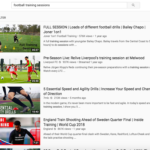Developing YouTube training sessions for your own team
We've all spoken to a coach who gets all his training sessions off of YouTube, right? YouTube, and the web, have been great for coaches as you can see sessions online, learn and try them in training. However, is a session that Pep Guardiola doing with his Man City players the right one to be doing with your team? Probably not!
Age and Stage
The above is a bit of a flippant example, but the point is that as coaches we need think about the age of our team and the stage of learning they are at. For example, if your team cannot pass and receive the ball properly, there is no point in getting them to try training drills that require these technical skills at a high standard. To gain these technical qualities, they need to firstly learn them in a safe and non-pressured environment - which is fancy way of saying that they need to learn unopposed and for the sessions to be initially mistake ridden!
If we are talking about youth players (u13) in particular, then they will probably need more than one session or one hour to learn a technique and the associated technical concepts. They also need time to be able to recognise how to apply what they've learned to the game itself. Constantly changing topics or themes in training, or doing sessions above their ability level, will not only prevent this learning from taking place, it will also confuse the players.
Structured Plan
This is where a structured plan underpinning your training can come in handy. Recognising that structure can help to promote learning of various topics will not only help your team, but also help individual players. For example, before you can get to playing out of the back properly, players need to learn how to receive the ball with an open body position and to take the ball with the back foot to play forward. It is very difficult to become competent in a particular area without firstly mastering the skill unopposed and then opposed.
The following is an example of a structured plan for building up to playing out from the back:

This plan is overly simplified but gives you a general idea about how this kind of framework can be used to build up to a theme over the course of several weeks. In other words, the plan is designed to teach your player how to play the game.
That is not say that there should not be flexibility in your approach so you can adapt and deal with an area of concern, but having structure to your training will help with the following:
- Having control of your players’ development
- Avoiding providing inappropriate training to the level of player
- Avoiding coaching based on a weakness seen in the last game. This is extremely important as a proactive coach teaches his team to play whereas a reactive one is constantly firefighting and changing themes and topics based on the last match
- Avoiding unstructured training where progress cannot be measured and refined
Also, if you have a structured plan then you can easily return to those same themes at a later date, adjusting the difficulty of the session depending on the age and stage of the players. This will be important as the game will get faster and more difficult for players, and the decision-making variables will increase as they progress and move from small sided games to the adult game.
Context
Another difficulty with getting sessions or a completed plan from the internet is the context of the sessions or plans. Those have been designed for a particular club and/or ability level. If a training session looks cool online, with a nice 4g facility and academy level players, there is no guarantee it will look as cool on a rutted grass pitch with grassroots players! Apply the weather variable to this, you never see the cool sessions done in the wind or snow, and it becomes extremely difficult to replicate these sessions and/or plans.
My point is that only you know your players and what they need, based on your principles as a coach and how you want your team to play. The best sessions are probably not going to be the ones you copy, but the ones you create yourself based on the needs of your team. This is difficult, but it is arguably what coaching at the youth level is all about. Identifying what your players need and creating the sessions to help them become better.
This article isn't a criticism of those coaches who look to the internet for help, as stated in the opening paragraph the internet has been great for coach education. If coaches can educate themselves to the tools that are available to fix a problem, identify the stage their team is at and put a plan in place to progress their players then they will be on the road to success.

